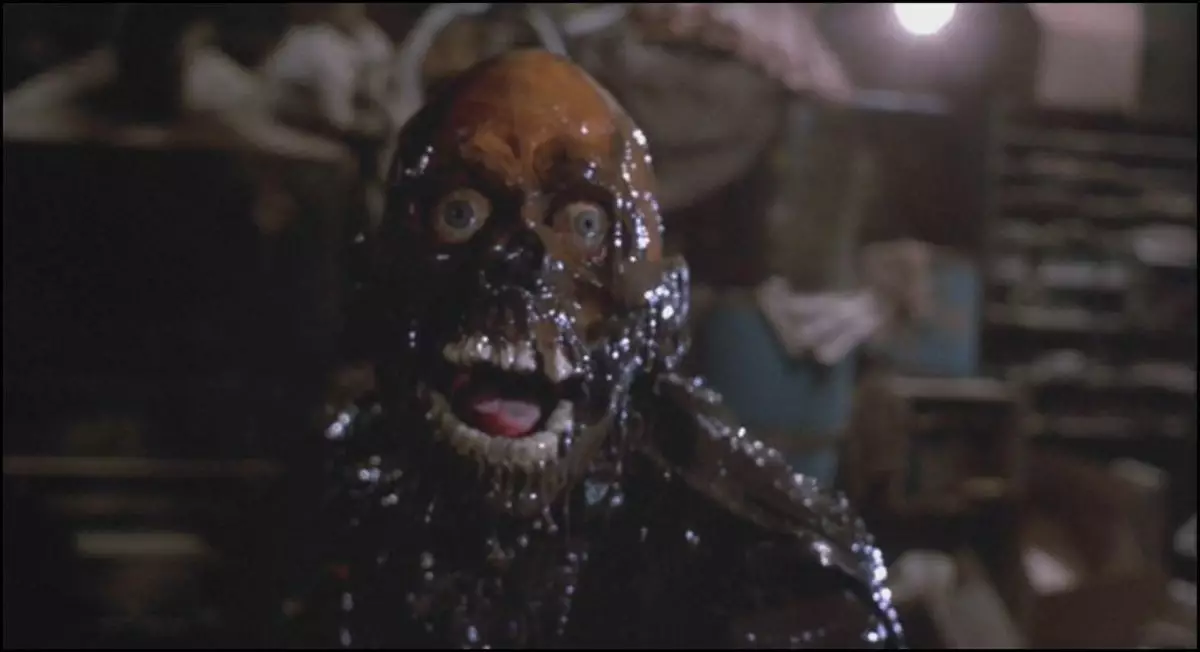A sandwich made with some kind of new, proprietary deli meat is always going to be seen in the shadow of the meat, with the experience of it as a whole obscured by the specific elements that compose it. ZombiU is in a similar situation, as part of the release crop of WiiU games it shoulders the burdens of being a “proof of concept” for a console with a lot to prove and standing as a game on its own. In the maelstrom of release mania, this is no small task.
Were I to draw something and hang it up with no other thought than self-expression the honesty of that act carries through. Were I to loudly proclaim that I was making art, draw something, label it “ART” then demand it be accepted as such the resulting picture, even if it were identical to the first, would be far more divisive. In this respect I think there is great value in returning to things once the hubbub has died down and ZombiU, with its unique approach to death, is worth taking a look at with post-hubbubian eyes.
Death of a player character in a game has never been an easy sell. When the structure of one’s interaction with a work is built on the idea that death is a failure, making death a part of the character’s story arc presents a number of inherent difficulties. Make it one of a number of possible endings and it will just be seen as a failure, the typical “bad ending”, meaning players will view it as a negative result of their improper play and invalidate it as an in canon element of the plot. In Resident Evil for instance, it is possible to let Jill/Chris and Rebecca get killed at various points in the game but this is not seen as the “actual” story by either players or Capcom wholly negating any emotional relevance it may have had.
The other alternative is to limit player control or remove it entirely with the endings of Red Dead Redemption and Mafia being respective examples of both. One puts you in a circumstance that it is a programmed impossibility to fight your way out of and the other is just a cutscene. The first time I encountered the former was at the end of the freeware Doom demo when you are teleported to a dark space filled with things that kill you. As a child I was certain that there was some way to avoid it and, much like the more recent generation’s attempts to revive Aeris, I pissed way too much time trying. To my young mind there simply had to be a way out because that was how games work, if you are dying you are doing something wrong and this trained mentality in gamers is what negates the programmed fail point as a viable character end. Ultimately, both are about taking control from the player and this never feels right. Like a character getting an off screen death in a viewed medium like film or TV, control removal is something that is so antithetical to gaming that it’s never really been pulled off.
ZombiU works around this by changing a traditional aspect of gameplay/story interaction. Your in-game avatar is not the protagonist but the agency of the protagonist and dividing the vessels for player ego projection allows for an interesting and effective approach to the problem of in-game death. The story is not one of someone surviving, it is a story of someone trying to help other people survive and the result is that you are always playing as a supporting character. This is not a choice without risk, by doing this the creators relinquish a significant degree of control over the players emotional engagement with the game. After all, any circumstance where enjoyment of something is predicated on the player’s “correct” interaction with it is one where a player can have a perfectly valid negative experience. The flip-side is that when it does work it tends to be more fun than the ‘cheap pop’ of being the protagonist. Like the saga of Me, Firstarino and Supercoon.
I’m a raging egomaniac so no matter how much of my ego goes where in a division each side gets a lot. I genuinely didn’t want Firstarino (the clever name I’d given my first guy) to die because, even though it would have had negligible impact on game progress, I had projected enough to care about him. By the two hour mark, having killed and raided other player characters who’d not survived as well as myself, Firstarino and I had bonded so even though he was essentially just “a life” in a game with infinite of said, I didn’t want him to go. But go he did, in a suitably epic showdown involving a mounted gun that I stupidly didn’t reload. I lost a life, just a life and my first one at that but I felt bad about it, cursing my own stupidity and turning the game off to think about something else for a while. Upon returning I was introduced to my new life, a big, black security guard. Awesome, Supercoon.
Permit me to explain.
The Supercoon phenomenon was something some friends and I noticed while watching loads of shitty 80’s and 90’s action films (and you’ll see it in a lot of games too). Most of them have some vast African American killbeast whose badassedness was what we could only assume was a misguided attempt at a positive portrayal. That negative/damaging stereotyping can involve superficially positive traits, “all Asians are good at math” for instance, didn’t occur to these filmmakers as they lauded a man, descended from slaves bred for physical utility, for his physical strength. This irony led us to dub the characters Supercoon, in a deliberate parody of any attempt at racial sensitivity that, due to a fairly basic misunderstanding, backfires wildly.
So in he and I stride to take on the zombie hordes with our mighty strength and righteousness honed through years of oppre—shit he’s dead already. Seriously, he lasted 20 fucking minutes and most of that was backtracking to get to where I had previously died. Now this death stung and serves as an example of what I mean about user controlled engagement. This was frustrating through nothing else than my own personal history. This character had no special background or relevance as far as the game was concerned and hadn’t done anything or been around long enough to otherwise care about. Despite this, his death had a significant effect on me. Supercoon was about to fuck shit up (in the good way), fucked shit up (the bad way) and got eaten. Later characters had similarly short lives but they didn’t matter as much because of what I had projected into the game.
Ultimately, as this is completely non-quantifiable element, it is hard to review its efficacy objectively but as it has the potential to give me such experiences I always appreciate the attempt. That and I never give anything approaching a shit when Mario falls down a hole, or I need to re-load a character after dying. By splitting the narrative and gameplay focus and by giving the ultimately meaningless agents a small degree of personality your in-game lives become more than just a number beside an “x”. This makes death relevant beyond a simple GAME OVER, while still maintaining direct player control. It’s something that I’ve not experienced (at least that I can draw to mind now) and it adds a unique element that makes it worthy of a look.
By Gabe





4 replies to Love in the Time of Solanum
Bungus Bronbo on 20th February 201920 Feb 19 said:
There's a strategy game called Into the Breach, that has time travel and multiple dimension shenanigans where you try and prevent the end of the world. But what's neat about it is that you have new iterations of the same character. Like in your first game, you have, say, Karl Karlsson. And then you mess up and he dies. But later on you might find a version of the same guy from a different dimension, Karl Karlsson v2.
I see that as similar to ZombiU, where you can absolutely develop attachment to your character and have them die from your fuckup, but it differs in that you get another version of your character. It's not like you go back in time and get the original character back, you get a new one. It's quite clever like that. The original Karl Karlsson is dead and gone, and that version of him no longer exists. But a new version of that character may come from another timeline. It's consistent, a good game, and your essay just made me think of that connection.
Leo on 11th February 201911 Feb 19 said:
I feel like that second paragraph is a pretty good explanation of why spur-of-the-moment quips generally go over well, but when you try to convert them into whole jokes that you tell later they kinda lose something.
Gabriel on 11th February 201911 Feb 19 said:
You've gotta recreate the circumstances. Stand-ups and essayists do it a bit but it requires some artificial construction which stands out like a sore thumb in an otherwise normal situation.
Leo on 11th February 201911 Feb 19 said:
Fair enough. I’ll admit I don’t watch much standup at all; I’m mostly speaking from personal experience.
Nice essay, by the way. I really enjoyed it.
Comment on Love in the Time of Solanum
To reply, please Log in